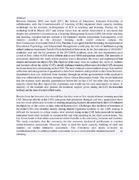| dc.description.abstract | Between October 2015 and April 2017, the School of Education, Kenyatta University in collaboration with the Commonwealth of Learning (COL) organized three capacity building workshops for its lecturers on Integration of ICT in teaching and learning. During the 3rd workshop held in March 2017 and whose focus was on online Assessment it was noted that despite the university’s investment in a Learning Management System (LMS) for online teaching and learning, lecturers had not utilized it for formative learner assessment. Consequently, even students enrolled in the distance learning mode would come to campus for their Continuous Assessment Tests (CATs). Therefore, it was agreed that after the training, the departments of Educational Psychology and Educational Management would play the role of trailblazers in giving online Continuous Assessments Tests (CATs) in the School of Education. In the 2nd semester of 2016/2017 academic year and the 1st semester of the 2017/2018 academic year, the two departments gave a total of four online CATS in four different units to over 9,000 undergraduate students. This innovation in assessment informed this study whose purpose was to document the views and experiences of both students and lecturers on online CATs. The objectives of the study were to: capture the views of students and lecturers about the online CATs; identify challenges hindering effectiveness of on-line CATs; document the lessons learnt from administering on-line CATs. The study embraced a mixed methods design that enabled collection and triangulation of quantitative data from students and qualitative data from lecturers. Quantitative data was collected from students through an online questionnaire while qualitative data was collected from lecturers through a Focus Group Discussion Guide. The results indicated that the students were initially apprehensive before the on-line CAT but after they were done a majority stated that they enjoyed the experience and would opt for such assessments in future. A majority of the students also praised the technical support given during the CAT, the immediate feedback and the sense of control of their marks.
Results from the lecturers also showed that that they were at first skeptical about mounting an on-line CAT. However, after the on-line CATs were given, their perception changed and they appreciated there was less work afterwards in terms of marking and grading. Lecturers also noted that on-line CATs enhanced the objectivity of the scores as they reduced human error. Challenges that hindered effectiveness of the on-line CATs were identified, namely: missing students’ registration numbers in the LMS making it difficult for lecturers to collate marks, slow internet during on-line CAT, faulty passwords for students, interruption from other students in computer lab and strict marking in the short answer items. The key lesson learnt is that online assessment confers benefits to the university, lecturers and students. The study concludes that the university has the resources (technical and human) to conduct online formative assessment. However, there is need for more capacity building of staff and students on online formative assessment. The University also needs to review its examination policy to embrace online assessment so as to cover possible malpracticessuch as cheating. | en_US |
